Moudle5 Museums词汇短语句型精讲 课件(共56张PPT)
文档属性
| 名称 | Moudle5 Museums词汇短语句型精讲 课件(共56张PPT) |
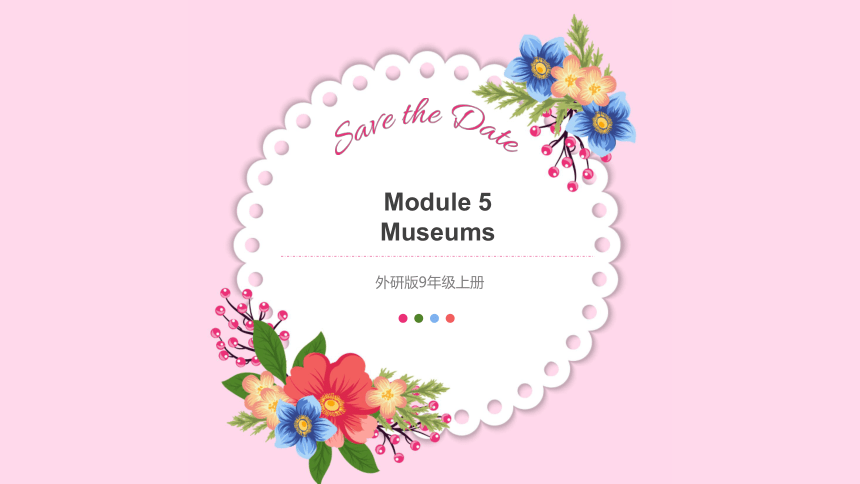
|
|
| 格式 | pptx | ||
| 文件大小 | 13.7MB | ||
| 资源类型 | 教案 | ||
| 版本资源 | 外研版 | ||
| 科目 | 英语 | ||
| 更新时间 | 2021-07-21 08:17:30 | ||
图片预览

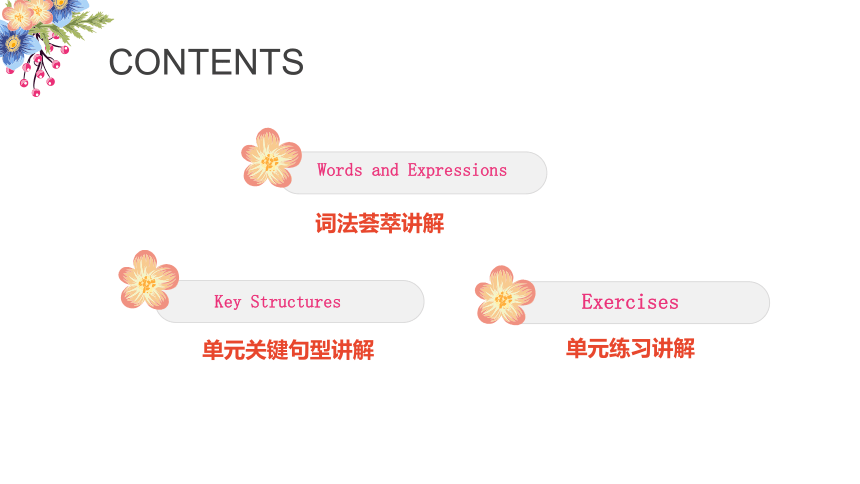
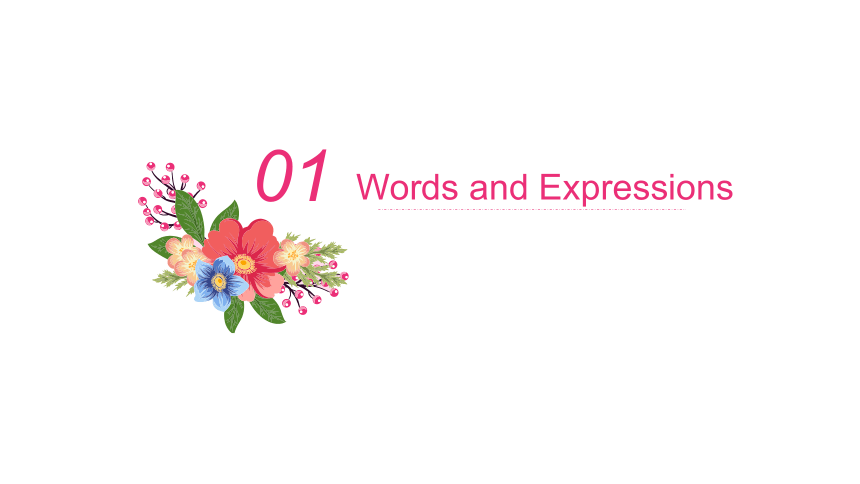
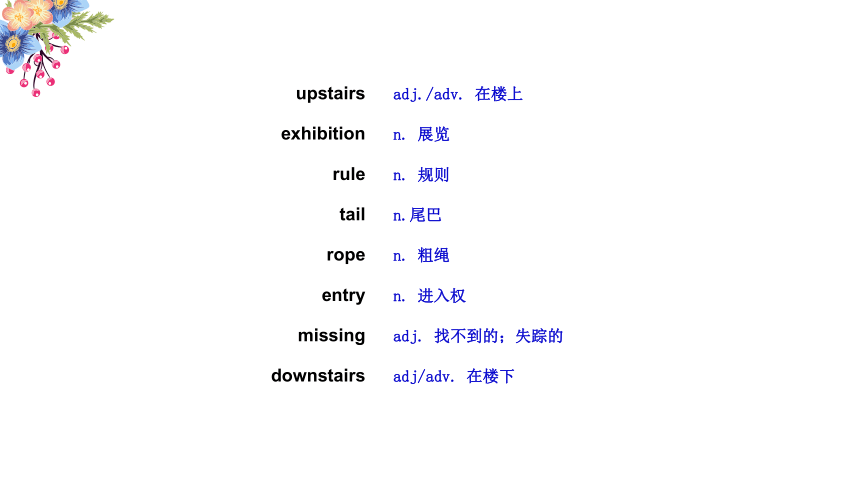
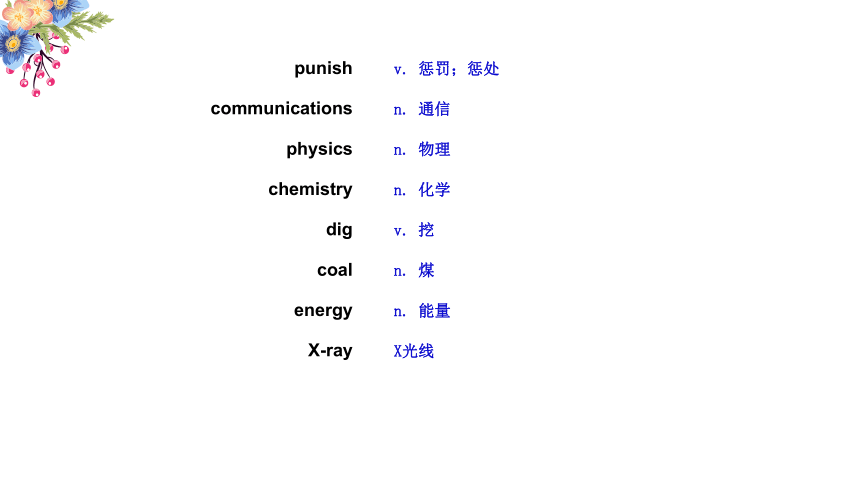
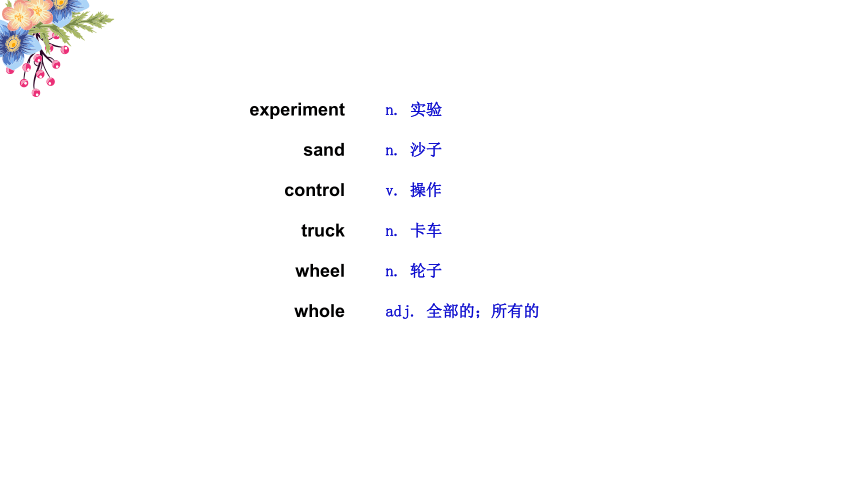
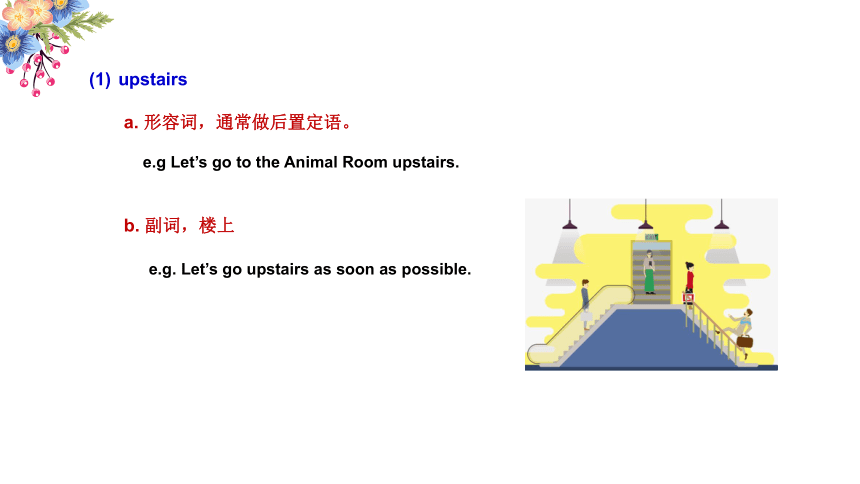
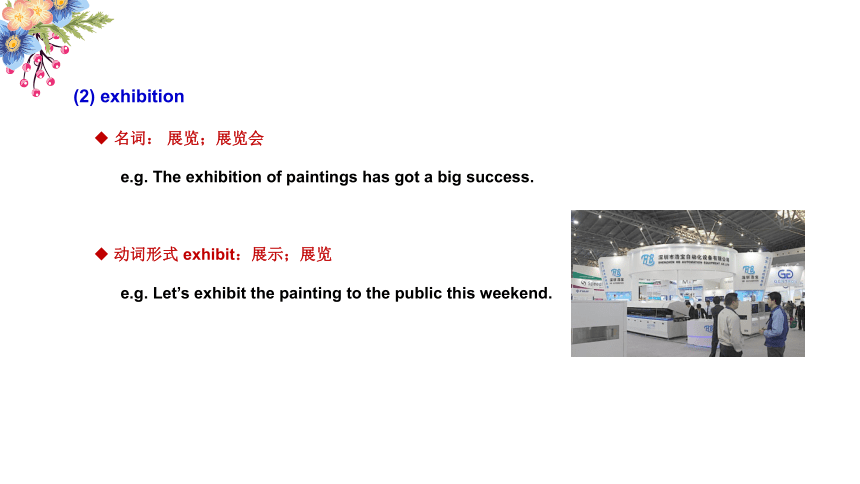
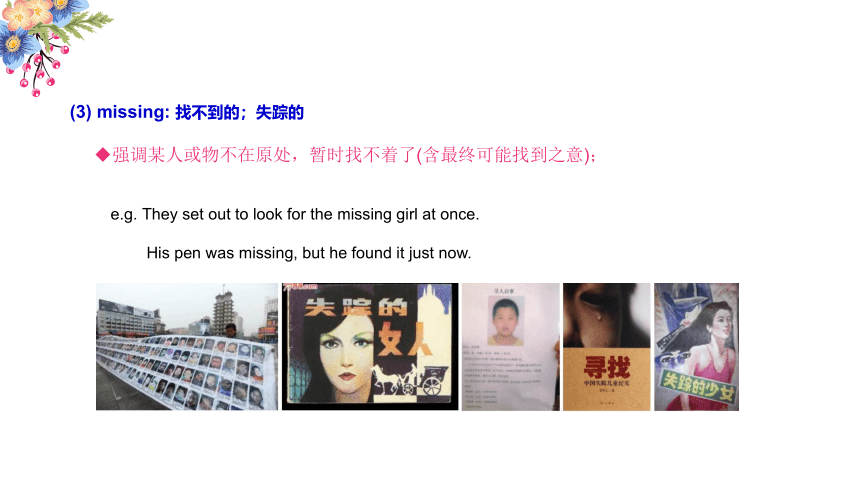
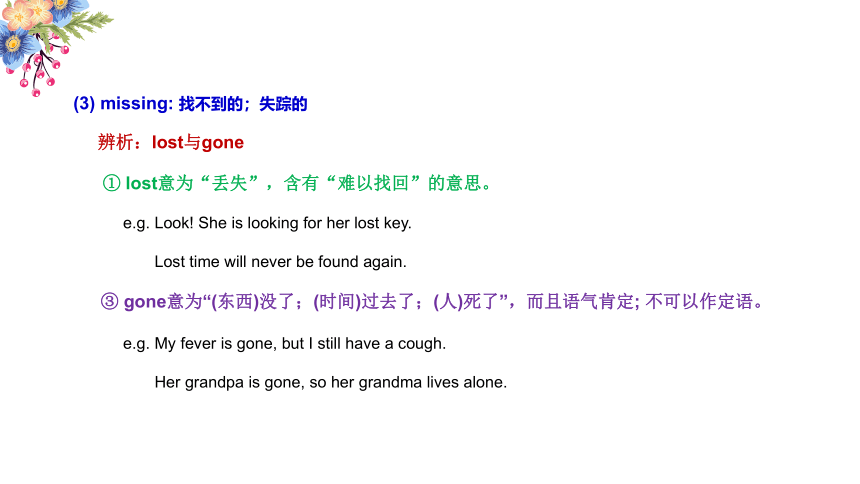
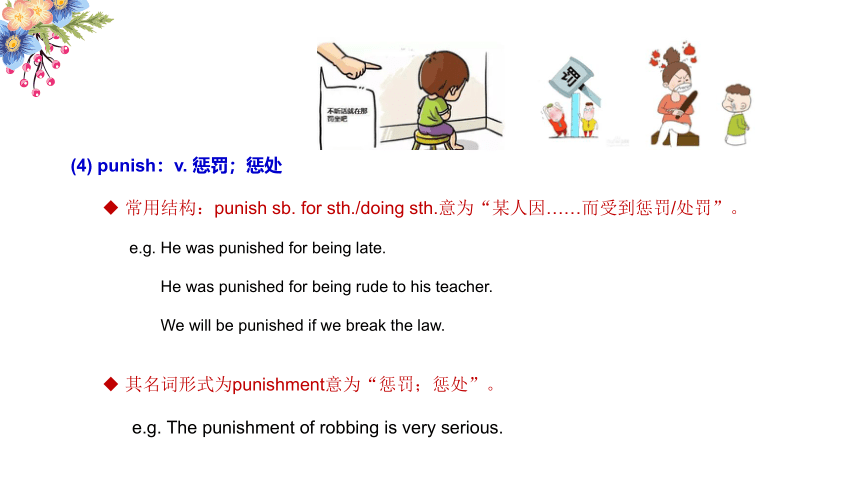
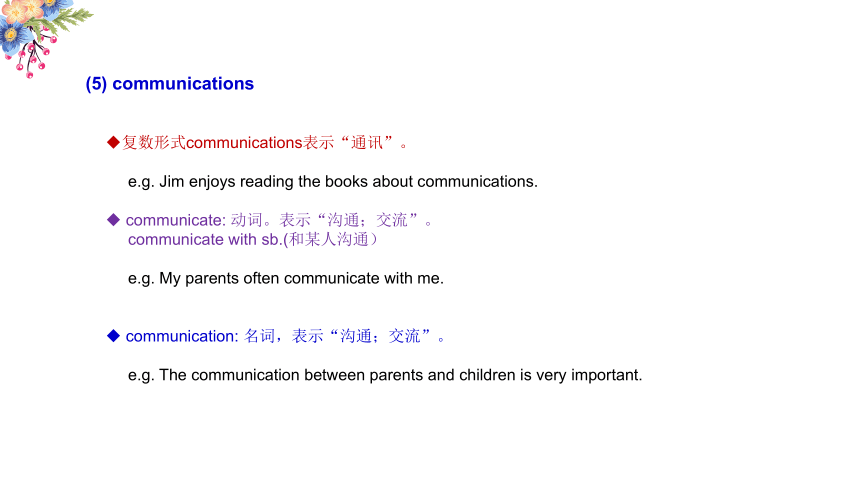
文档简介
Module 5
Museums
外研版9年级上册
词法荟萃讲解
Words and Expressions
单元关键句型讲解
Key Structures
CONTENTS
Exercises
单元练习讲解
01
Words and Expressions
upstairs
exhibition
rule
tail
rope
entry
missing
downstairs
adj./adv. 在楼上
n. 展览
n. 规则
n.尾巴
n. 粗绳
n. 进入权
adj. 找不到的;失踪的
adj/adv. 在楼下
punish
communications
physics
chemistry
dig
coal
energy
X-ray
v. 惩罚;惩处
n. 通信
n. 物理
n. 化学
v. 挖
n. 煤
n. 能量
X光线
experiment
sand
control
truck
wheel
whole
n. 实验
n. 沙子
v. 操作
n. 卡车
n. 轮子
adj. 全部的;所有的
upstairs
a. 形容词,通常做后置定语。
e.g Let’s go to the Animal Room upstairs.
b. 副词,楼上
e.g. Let’s go upstairs as soon as possible.
(2) exhibition
名词: 展览;展览会
e.g. The exhibition of paintings has got a big success.
动词形式 exhibit:展示;展览
e.g. Let’s exhibit the painting to the public this weekend.
(3) missing: 找不到的;失踪的
强调某人或物不在原处,暂时找不着了(含最终可能找到之意);
e.g. They set out to look for the missing girl at once.
His pen was missing, but he found it just now.
(3) missing: 找不到的;失踪的
辨析:lost与gone
① lost意为“丢失”,含有“难以找回”的意思。
e.g. Look! She is looking for her lost key.
Lost time will never be found again.
③ gone意为“(东西)没了;(时间)过去了;(人)死了”,而且语气肯定; 不可以作定语。
e.g. My fever is gone, but I still have a cough.
Her grandpa is gone, so her grandma lives alone.
(4) punish:v. 惩罚;惩处
常用结构:punish sb. for sth./doing sth.意为“某人因……而受到惩罚/处罚”。
e.g. He was punished for being late.
He was punished for being rude to his teacher.
We will be punished if we break the law.
其名词形式为punishment意为“惩罚;惩处”。
e.g. The punishment of robbing is very serious.
(5) communications
复数形式communications表示“通讯”。
e.g. Jim enjoys reading the books about communications.
communicate: 动词。表示“沟通;交流”。
communicate with sb.(和某人沟通)
e.g. My parents often communicate with me.
communication: 名词,表示“沟通;交流”。
e.g. The communication between parents and children is very important.
(5)whole adj. 整个的;全部的
whole与all的用法辨析:
①whole和all两者都用作形容词,意为“整个的;全部的”;
whole位于限定词(定冠词、指示代词、物主代词及所有格)之后;
all位于限定词(定冠词、指示代词、物主代词及所有格)之前。
e.g. The whole school/all the school was empty. 整个学校空无一人。
Guilin is famous not only in China but also in the whole world/ all the world.
(5)whole adj. 整个的;全部的
whole与all的用法辨析:
②修饰不可数名词或可数名词复数时,一般用all。
e.g. I know all those people.
Jane?has?drunk?all?the?milk.??
She spent all her money on books.
(5)whole adj. 整个的;全部的
whole与all的用法辨析:
③在表示地名的专有名词前用all,不用whole,但可用the whole of;
e.g. 不能说the whole China,但可说the whole of China,
用all时则可表示为all China。
Li Ming travelled the whole China/all China in the past few years.
against the rules
in trouble
No entry
no good
no wonder
compare…with…
of all ages
违反规定
处在麻烦中
禁止入内
不合适的
难怪
比较…与…
所有年龄段的
No shouting
go upstairs / downstairs
the lost and found office
welcome to ...
answers to...
the right place
learn about
as well as
禁止喧哗
上楼/下楼
失物招领处
欢迎来到……
……的答案
正确的地方
了解
并且;还(连接并列成分)
find out
dig coal from the ground
use ... to do sth.
create energy
physics experiments
fill ... with ...
a kind of
move...into...
找出;查明
从地下挖煤
用……做某事
创造能源
物理实验
用……装满……
一种
把……移进……里
have a wonderful time
be free to enter
make sure
in the whole world
on time
look forward to
pay attention
玩得开心
免费进入
确保
在全世界
准时
盼望;期待
注意;重视
against the rules
against是介词,有多种意思,其用法如下:
① against意为“违反,反对”,它的反义词是for,意为“赞同,赞成,同意”;
against可构成很多词组。
be against sb./sth.反对某人/某事;
be against the rule(s)违反规定;
be against doing sth.放弃/反对做某事,反义短语为be for doing sth.支持做某事。
e.g. Fighting with others is against the rules.
We are against/for the suggestion.
against the rules
against是介词,有多种意思,其用法如下:
② against意为“与……对抗,(在比赛/战斗中)对(某人/物)”。
它常与play, fight, speak, act, vote, struggle, argue等动词连用。
e.g. They were fighting against the enemy.
Who are you playing against in the next match?
③ against意为“靠着;紧靠”,表示位置。
e.g. A piano stood against the wall.
be in trouble: 遇到麻烦;处于困境
e.g. Listen to my advice, or you will be in trouble.
Uncle Black was in trouble after running out of his money.
【拓展】
与trouble有关的短语:
ask for trouble自寻烦恼;自找麻烦;
put sb. to trouble给某人造成麻烦;增添麻烦;
make trouble引起麻烦;
get into trouble陷入困境;遇到麻烦;
have trouble (in) doing sth. 做某事有困难;
give sb. trouble麻烦某人。
no entry “禁止进入”
“No+名词”,可以用来表达“禁止做某事”。
e.g. No photos.
No food and drinks.
compare…with…
compare…with…,compare…to…与compared with/to...的用法辨析:
① compare…with…意为“拿……和……作比较;把……与……相比”(同类相比)。
e.g. Mr. Wu likes to compare Class Three with Class Five.
The teacher are always comparing me with my elder sister.
② compare…to…意为“把……比做……”(异类相比,比喻)。
e.g. People often compare a teacher to a candle.
We usually compare the nurses to the white angels.
compare…with…
compare…with…,compare…to…与compared with/to...的用法辨析:
③ compared with/to...意为“和……相比”,该短语通常要求与其他词语组成独立状语,放在句首。
e.g. Compared with/to other cities, I think Guilin is more beautiful.
Compared with/to last year, we have had more success this year.
of all ages: 所有年龄段的
e.g. People of all ages visit the museum.
Flying kites is popular among people of all ages.
02
Key structures
可以用来表达“禁止做某事”的结构有:
① No+动名词(最常用)。
e.g. No joking! 不要开玩笑!
② No+名词。
e.g. No photos.
Don’t touch. 请勿触摸。No smoking. 禁止吸烟。No shouting, please! 请勿喧哗!No photos. 禁止拍照。
可以用来表达“禁止做某事”的结构有:
③(肯定或否定)祈使句。
e.g. Keep off the grass.
Don’t make any noise.
④主语+ mustn’t/ shouldn’t/ can’t +动词原形。
e.g. We mustn’t fish. 禁止垂钓!
Don’t touch. 请勿触摸。No smoking. 禁止吸烟。No shouting, please! 请勿喧哗!No photos. 禁止拍照。
可以用来表达“禁止做某事”的结构有:
⑤You aren’t allowed to+动词原形。你不允许做某事。
e.g. You aren’t allowed to play football on th road.
You aren’t allowed to shout loudly in the dinning room.
禁止触摸:
Don’t touch. 请勿触摸。No smoking. 禁止吸烟。No shouting, please! 请勿喧哗!No photos. 禁止拍照。
可以用来表达“禁止做某事”的结构有:
⑤You aren’t allowed to+动词原形。你不允许做某事。
e.g. You aren’t allowed to play football on th road.
You aren’t allowed to shout loudly in the dinning room.
禁止触摸:
①No touching.③Don’t touch.④You mustn’t\can’t\ shouldn’t touch.
⑤You aren’t allowed to touch.
Don’t touch. 请勿触摸。No smoking. 禁止吸烟。No shouting, please! 请勿喧哗!No photos. 禁止拍照。
Let’s+动词原形。意为“让我们做……吧”,用于提出请求建议;
否定形式为Let’s not do sth.意为“让我们不要做某事”。
肯定回答一般用 “OK./All right.”;否定回答一般用 “Sorry, I…”。
e.g. Let’s go and see the pandas.
Let’s not play here.
Let’s go to the Animal Room upstairs. 我们去楼上的动物展厅吧。
【辨析】let’s与let us的用法辨析:
① let’s用于提出建议,包括听话者在内,在“Let’s”句型中,反意疑问部分要用shall we
或shan’t we。
e.g. Let’s try it again. 让我们再试试吧。
Let’s go to see the film, shall we? 咱们去看电影,好吗?
② let us表示请求对方允许做某事,不包括听话者在内,在“Let us”句型中,反意疑问
部分要用“will/won’t you”,表示请求。
e.g. Let us know the time of your arrival.
Let us do it by ourselves.
Let us go to see the film, will you?
Let’s go to the Animal Room upstairs. 我们去楼上的动物展厅吧。
I need some information for my project. 我需要一些有关研究性学习的资料。
need意为“需要”。它既可用作实义动词,也可以用作情态动词。
① need作实义动词,意为“需要”。
need to do sth.“需要做某事”
need sb. to do sth.“需要某人做某事”
e.g. I need to water the flowers every day.
---- Do you need to go at once? ---- Yes, I do. /---- No, I don’t.
I need some information for my project. 我需要一些有关研究性学习的资料。
need意为“需要”。它既可用作实义动词,也可以用作情态动词。
② need作情态动词,无人称或数的变化,后接动词原形,主要用于否定句和疑问句中,意为“需 要;必须”。
其否定形式为needn’t,表示“没有必要,不必”;
对由need构成的疑问句进行回答时,其肯定回答用must,否定回答用 needn’t。
e.g. You needn’t worry.
---- Need we do some cleaning now?
---- Yes, you must. ---- No, you needn’t.
That’s no good! Well, I’ll just take a photo... 太不好了!嗯,那我就拍张照片……
no good意为“无益,没有好处;不合适的;不方便的”。
句型:It’s no good doing sth.意为“做某事没有益处”。
e.g. It’s no good going there.
---- Let’s ask Tom not to speak loudly here.
---- That’s no good! He is too difficult.
no?wonder是It’s?no?wonder?that的省略形式,意为“难怪;不足为奇”。
当我们对某事并不十分了解,但经对方一番解说后感到茅塞顿开时,就可以使用本句。
如果你想表达更加具体的含义的话,就在后面加完整的句子。
e.g. No wonder you look so upset.
It rained quite heavily. No wonder you were late!
It’s no wonder that the earth is becoming warmer and warmer.
No wonder the place is empty! 难怪这个地方没什么人呢!
Welcome to the most friendly museum in London. 欢迎来到伦敦最友好的博物馆。
friendly意为“友好的”,通常在句中作表语,其比较级形式为friendlier,其最高级形式为friendliest。
be friendly to sb.意为“对某人友好”。
in a friendly way: 用一种友好的方式。
e.g. We should be friendly to our classmates.
Who is the friendliest to you, Lucy, Lily or Mary?
If you want answers to all your questions about science, this is the right place for you. 如果你想要得到关于科学的所有问题的答案,你来对地方了。
(the)answers to...意为“……的答案”,answer是名词,其后用介词to。
the key to...……的钥匙。
e.g. What was the answer to question 4?
This is the key to the door.
For example, you can find out how people dig coal from the ground and use it to create energy. 例如,你能弄清楚人们是如何从地下挖煤并用它来创造能量的。
【辨析】for example,such as与like的用法辨析:
① for example意为“比如,例如”, 举例说明某一论点或情况,一般只举同类人或物中的“一个”,
用逗号隔开,可置于句首、句中或句末。
e.g. Noise, for example, is a kind of pollution.
② such as 意为“比如,例如”,常列举同类人或物中的几个例子,不能穷尽,可和and so on连用,
可和like互换。
e.g. He learns many subjects, such as English, math and Chinese.
China has many big cities, such as Beijing, Shanghai, Shenzhen and so on.
For example, you can find out how people dig coal from the ground and use it to create energy. 例如,你能弄清楚人们是如何从地下挖煤并用它来创造能量的。
【辨析】for example,such as与like的用法辨析:
③ like介词,意为“像;例如”,表示列举,相当于such as。
e.g. Mr. Li keeps animals, like dogs, pigs and sheep, on the farm.
For example, you can find out how people dig coal from the ground and use it to create energy. 例如,你能弄清楚人们是如何从地下挖煤并用它来创造能量的。
【辨析】find out, find与look for的用法辨析
① find out表示通过理解、分析、调查、询问、打听、研究等“弄清楚,找出,查明”某个情况、事实。
e.g. Please find out when the train leaves.
Can you find out when the meeting will start?
② find意为“找到,发现”,强调的是找的结果,其宾语往往是某个丢失的东西或人。
e.g. I can’t find my bag.
③ look for意为“寻找”,是有目的地找,强调“寻找”这一动作。
e.g. I’m looking for my pen.
For example, you can find out how people dig coal from the ground and use it to create energy. 例如,你能弄清楚人们是如何从地下挖煤并用它来创造能量的。
【辨析】find out, find与look for的用法辨析
energy是不可数名词,意为“能源;能量;精力;活力”,其形容词形式为energetic意为“充满活力的;
精力充沛的”。
e.g. Young people usually have more energy than the old.
One of the popular expressions in 2012 was “Positive energy”.
For example, if you want to fill a bag with sand, you have to control a kind of truck on wheels and move it into the correct place. 例如,如果想把一个袋子装满沙子,你就得操控一种带轮子的运输车,并把车移动到正确的位置。
【辨析】fill...with…与be filled with...的用法辨析:
① fill...with...为动词短语, 意为“把……用……装满”。主语为人,fill后一般接容器,with后接容
器中装的物品。
e.g. I want to fill the box with books.
②常用短语be filled with...表示“……被……装满”,表示动作,其同义短语为be full of...,
表示状态。
e.g. The cup is filled with coffee.= The cup is full of coffee.
For example, if you want to fill a bag with sand, you have to control a kind of truck on wheels and move it into the correct place.
例如,如果想把一个袋子装满沙子,你就得操控一种带轮子的运输车,并把车移动到正确的位置。
move...into...意为“把……移进……”,move是动词,意为“移动”;
与move有关的短语move into搬进;move out of搬出。
e.g. Can you help me move this basket into the box?
be free to enter意为“免费进入”
be free to do sth. 意为“自由地去做某事”。
e.g. You are free to go or to stay.
Everyone is?free?to express himself. ?
Workers enjoy?free?medical care.
The museum is free to enter, so you can go in for a few minutes or stay all day. 博物馆免费进入,所以你可以在那里待几分钟或者一整天。
Please pay attention to some machines or tools invented in ancient China. 请注意中国古代发明的一些机器和工具。
pay attention to意为“注意,重视”, to在此处是介词,后接名词、代词、动名词或从句作宾语。
attention是一个抽象名词,没有复数形式。
e.g. Pay attention to listening, don’t make noise.
【拓展】常见以介词to结尾后接动名词的词组有:
be/get/become used to习惯于;
put one’s mind to全神贯注于;
give one’s life to献身于。
look forward to盼望,期待;
thanks to多亏了;由于;
prefer...to...喜欢……胜过喜欢……;
I’m looking forward to reading the reports of your visit. 我期待阅读你们的参观报告。
look forward to意为“盼望,期待”,其中to为介词,后跟名词、代词或动名词形式。
e.g. They are looking forward to your visit.
I’m looking forward to working with you again.
03
Exercise
1. ---All of the soldiers were busy saving the wound people after the earthquake, without rest !
--- _____ they looked so tired
A. I wonder B. It seemed C. No wonder D. I bet
2. ---Does the child need any help?
----No. She is ______ to dress herself
A. enough old B. young enough C. old enough D. enough young
3. Be careful,the glass _____ hot water.
A. full of B. is filled with C. fill with D. is filled of
4. ---Why did you fail in your last test, Daming ?
--- Because I didn’t _______attention to listening to the teacher carefully in class
A take B. cost C. pay D. spend
5. They can’t allow you _______the rope.
A. cross B. to cross C. crossing D. crosses
6. You can compare your speed ______animals in the museum.
A. with B. to C. at D. for
7. To invent a new kind of invention, he did lots of ______
A. experiences B. experiments C. explanations D. suggestions
8. Welcome to ________ museum in Zhucheng.
A. the friendly B. more friendly C. the most friendly D. the friendliest
9. Do you believe some special dogs can do things ________man?
A. as good as B. as well as C. as better as D. as careful as
10. They are looking forward to _______to Beijing this summer.
A. fly B. flying C. will fly D. flied
11. I am good at basketball and I do well in football _________.
A. as well as B. neither C. either D. as well
12. Your school team will play ______us this afternoon.
A. for B. to C. with D. against
13. If any student ______a high fever, ______him to the hospital.
A. have; send B. has; to send C. has; send D. have; to send
14. You______ smoke when you see the sign
A. must B. should C. mustn’t D. needn’t
15. _____you ______he is able to skate, but I can.
A. Both; and B. Not only; but also C. Either; or D. Neither; nor
1. ---All of the soldiers were busy saving the wound people after the earthquake, without rest !
--- _____ they looked so tired
A. I wonder B. It seemed C. No wonder D. I bet
2. ---Does the child need any help?
----No. She is ______ to dress herself
A. enough old B. young enough C. old enough D. enough young
3. Be careful,the glass _____ hot water.
A. full of B. is filled with C. fill with D. is filled of
4. ---Why did you fail in your last test, Daming ?
--- Because I didn’t _______attention to listening to the teacher carefully in class
A take B. cost C. pay D. spend
5. They can’t allow you _______the rope.
A. cross B. to cross C. crossing D. crosses
C
B
C
C
B
6. You can compare your speed ______animals in the museum.
A. with B. to C. at D. for
7. To invent a new kind of invention, he did lots of ______
A. experiences B. experiments C. explanations D. suggestions
8. Welcome to ________ museum in Zhucheng.
A. the friendly B. more friendly C. the most friendly D. the friendliest
9. Do you believe some special dogs can do things ________man?
A. as good as B. as well as C. as better as D. as careful as
10. They are looking forward to _______to Beijing this summer.
A. fly B. flying C. will fly D. flied
A
B
C
B
B
11. I am good at basketball and I do well in football _________.
A. as well as B. neither C. either D. as well
12. Your school team will play ______us this afternoon.
A. for B. to C. with D. against
13. If any student ______a high fever, ______him to the hospital.
A. have; send B. has; to send C. has; send D. have; to send
14. You______ smoke when you see the sign
A. must B. should C. mustn’t D. needn’t
15. _____you ______he is able to skate, but I can.
A. Both; and B. Not only; but also C. Either; or D. Neither; nor
D
D
C
C
D
感谢您的观看
Museums
外研版9年级上册
词法荟萃讲解
Words and Expressions
单元关键句型讲解
Key Structures
CONTENTS
Exercises
单元练习讲解
01
Words and Expressions
upstairs
exhibition
rule
tail
rope
entry
missing
downstairs
adj./adv. 在楼上
n. 展览
n. 规则
n.尾巴
n. 粗绳
n. 进入权
adj. 找不到的;失踪的
adj/adv. 在楼下
punish
communications
physics
chemistry
dig
coal
energy
X-ray
v. 惩罚;惩处
n. 通信
n. 物理
n. 化学
v. 挖
n. 煤
n. 能量
X光线
experiment
sand
control
truck
wheel
whole
n. 实验
n. 沙子
v. 操作
n. 卡车
n. 轮子
adj. 全部的;所有的
upstairs
a. 形容词,通常做后置定语。
e.g Let’s go to the Animal Room upstairs.
b. 副词,楼上
e.g. Let’s go upstairs as soon as possible.
(2) exhibition
名词: 展览;展览会
e.g. The exhibition of paintings has got a big success.
动词形式 exhibit:展示;展览
e.g. Let’s exhibit the painting to the public this weekend.
(3) missing: 找不到的;失踪的
强调某人或物不在原处,暂时找不着了(含最终可能找到之意);
e.g. They set out to look for the missing girl at once.
His pen was missing, but he found it just now.
(3) missing: 找不到的;失踪的
辨析:lost与gone
① lost意为“丢失”,含有“难以找回”的意思。
e.g. Look! She is looking for her lost key.
Lost time will never be found again.
③ gone意为“(东西)没了;(时间)过去了;(人)死了”,而且语气肯定; 不可以作定语。
e.g. My fever is gone, but I still have a cough.
Her grandpa is gone, so her grandma lives alone.
(4) punish:v. 惩罚;惩处
常用结构:punish sb. for sth./doing sth.意为“某人因……而受到惩罚/处罚”。
e.g. He was punished for being late.
He was punished for being rude to his teacher.
We will be punished if we break the law.
其名词形式为punishment意为“惩罚;惩处”。
e.g. The punishment of robbing is very serious.
(5) communications
复数形式communications表示“通讯”。
e.g. Jim enjoys reading the books about communications.
communicate: 动词。表示“沟通;交流”。
communicate with sb.(和某人沟通)
e.g. My parents often communicate with me.
communication: 名词,表示“沟通;交流”。
e.g. The communication between parents and children is very important.
(5)whole adj. 整个的;全部的
whole与all的用法辨析:
①whole和all两者都用作形容词,意为“整个的;全部的”;
whole位于限定词(定冠词、指示代词、物主代词及所有格)之后;
all位于限定词(定冠词、指示代词、物主代词及所有格)之前。
e.g. The whole school/all the school was empty. 整个学校空无一人。
Guilin is famous not only in China but also in the whole world/ all the world.
(5)whole adj. 整个的;全部的
whole与all的用法辨析:
②修饰不可数名词或可数名词复数时,一般用all。
e.g. I know all those people.
Jane?has?drunk?all?the?milk.??
She spent all her money on books.
(5)whole adj. 整个的;全部的
whole与all的用法辨析:
③在表示地名的专有名词前用all,不用whole,但可用the whole of;
e.g. 不能说the whole China,但可说the whole of China,
用all时则可表示为all China。
Li Ming travelled the whole China/all China in the past few years.
against the rules
in trouble
No entry
no good
no wonder
compare…with…
of all ages
违反规定
处在麻烦中
禁止入内
不合适的
难怪
比较…与…
所有年龄段的
No shouting
go upstairs / downstairs
the lost and found office
welcome to ...
answers to...
the right place
learn about
as well as
禁止喧哗
上楼/下楼
失物招领处
欢迎来到……
……的答案
正确的地方
了解
并且;还(连接并列成分)
find out
dig coal from the ground
use ... to do sth.
create energy
physics experiments
fill ... with ...
a kind of
move...into...
找出;查明
从地下挖煤
用……做某事
创造能源
物理实验
用……装满……
一种
把……移进……里
have a wonderful time
be free to enter
make sure
in the whole world
on time
look forward to
pay attention
玩得开心
免费进入
确保
在全世界
准时
盼望;期待
注意;重视
against the rules
against是介词,有多种意思,其用法如下:
① against意为“违反,反对”,它的反义词是for,意为“赞同,赞成,同意”;
against可构成很多词组。
be against sb./sth.反对某人/某事;
be against the rule(s)违反规定;
be against doing sth.放弃/反对做某事,反义短语为be for doing sth.支持做某事。
e.g. Fighting with others is against the rules.
We are against/for the suggestion.
against the rules
against是介词,有多种意思,其用法如下:
② against意为“与……对抗,(在比赛/战斗中)对(某人/物)”。
它常与play, fight, speak, act, vote, struggle, argue等动词连用。
e.g. They were fighting against the enemy.
Who are you playing against in the next match?
③ against意为“靠着;紧靠”,表示位置。
e.g. A piano stood against the wall.
be in trouble: 遇到麻烦;处于困境
e.g. Listen to my advice, or you will be in trouble.
Uncle Black was in trouble after running out of his money.
【拓展】
与trouble有关的短语:
ask for trouble自寻烦恼;自找麻烦;
put sb. to trouble给某人造成麻烦;增添麻烦;
make trouble引起麻烦;
get into trouble陷入困境;遇到麻烦;
have trouble (in) doing sth. 做某事有困难;
give sb. trouble麻烦某人。
no entry “禁止进入”
“No+名词”,可以用来表达“禁止做某事”。
e.g. No photos.
No food and drinks.
compare…with…
compare…with…,compare…to…与compared with/to...的用法辨析:
① compare…with…意为“拿……和……作比较;把……与……相比”(同类相比)。
e.g. Mr. Wu likes to compare Class Three with Class Five.
The teacher are always comparing me with my elder sister.
② compare…to…意为“把……比做……”(异类相比,比喻)。
e.g. People often compare a teacher to a candle.
We usually compare the nurses to the white angels.
compare…with…
compare…with…,compare…to…与compared with/to...的用法辨析:
③ compared with/to...意为“和……相比”,该短语通常要求与其他词语组成独立状语,放在句首。
e.g. Compared with/to other cities, I think Guilin is more beautiful.
Compared with/to last year, we have had more success this year.
of all ages: 所有年龄段的
e.g. People of all ages visit the museum.
Flying kites is popular among people of all ages.
02
Key structures
可以用来表达“禁止做某事”的结构有:
① No+动名词(最常用)。
e.g. No joking! 不要开玩笑!
② No+名词。
e.g. No photos.
Don’t touch. 请勿触摸。No smoking. 禁止吸烟。No shouting, please! 请勿喧哗!No photos. 禁止拍照。
可以用来表达“禁止做某事”的结构有:
③(肯定或否定)祈使句。
e.g. Keep off the grass.
Don’t make any noise.
④主语+ mustn’t/ shouldn’t/ can’t +动词原形。
e.g. We mustn’t fish. 禁止垂钓!
Don’t touch. 请勿触摸。No smoking. 禁止吸烟。No shouting, please! 请勿喧哗!No photos. 禁止拍照。
可以用来表达“禁止做某事”的结构有:
⑤You aren’t allowed to+动词原形。你不允许做某事。
e.g. You aren’t allowed to play football on th road.
You aren’t allowed to shout loudly in the dinning room.
禁止触摸:
Don’t touch. 请勿触摸。No smoking. 禁止吸烟。No shouting, please! 请勿喧哗!No photos. 禁止拍照。
可以用来表达“禁止做某事”的结构有:
⑤You aren’t allowed to+动词原形。你不允许做某事。
e.g. You aren’t allowed to play football on th road.
You aren’t allowed to shout loudly in the dinning room.
禁止触摸:
①No touching.③Don’t touch.④You mustn’t\can’t\ shouldn’t touch.
⑤You aren’t allowed to touch.
Don’t touch. 请勿触摸。No smoking. 禁止吸烟。No shouting, please! 请勿喧哗!No photos. 禁止拍照。
Let’s+动词原形。意为“让我们做……吧”,用于提出请求建议;
否定形式为Let’s not do sth.意为“让我们不要做某事”。
肯定回答一般用 “OK./All right.”;否定回答一般用 “Sorry, I…”。
e.g. Let’s go and see the pandas.
Let’s not play here.
Let’s go to the Animal Room upstairs. 我们去楼上的动物展厅吧。
【辨析】let’s与let us的用法辨析:
① let’s用于提出建议,包括听话者在内,在“Let’s”句型中,反意疑问部分要用shall we
或shan’t we。
e.g. Let’s try it again. 让我们再试试吧。
Let’s go to see the film, shall we? 咱们去看电影,好吗?
② let us表示请求对方允许做某事,不包括听话者在内,在“Let us”句型中,反意疑问
部分要用“will/won’t you”,表示请求。
e.g. Let us know the time of your arrival.
Let us do it by ourselves.
Let us go to see the film, will you?
Let’s go to the Animal Room upstairs. 我们去楼上的动物展厅吧。
I need some information for my project. 我需要一些有关研究性学习的资料。
need意为“需要”。它既可用作实义动词,也可以用作情态动词。
① need作实义动词,意为“需要”。
need to do sth.“需要做某事”
need sb. to do sth.“需要某人做某事”
e.g. I need to water the flowers every day.
---- Do you need to go at once? ---- Yes, I do. /---- No, I don’t.
I need some information for my project. 我需要一些有关研究性学习的资料。
need意为“需要”。它既可用作实义动词,也可以用作情态动词。
② need作情态动词,无人称或数的变化,后接动词原形,主要用于否定句和疑问句中,意为“需 要;必须”。
其否定形式为needn’t,表示“没有必要,不必”;
对由need构成的疑问句进行回答时,其肯定回答用must,否定回答用 needn’t。
e.g. You needn’t worry.
---- Need we do some cleaning now?
---- Yes, you must. ---- No, you needn’t.
That’s no good! Well, I’ll just take a photo... 太不好了!嗯,那我就拍张照片……
no good意为“无益,没有好处;不合适的;不方便的”。
句型:It’s no good doing sth.意为“做某事没有益处”。
e.g. It’s no good going there.
---- Let’s ask Tom not to speak loudly here.
---- That’s no good! He is too difficult.
no?wonder是It’s?no?wonder?that的省略形式,意为“难怪;不足为奇”。
当我们对某事并不十分了解,但经对方一番解说后感到茅塞顿开时,就可以使用本句。
如果你想表达更加具体的含义的话,就在后面加完整的句子。
e.g. No wonder you look so upset.
It rained quite heavily. No wonder you were late!
It’s no wonder that the earth is becoming warmer and warmer.
No wonder the place is empty! 难怪这个地方没什么人呢!
Welcome to the most friendly museum in London. 欢迎来到伦敦最友好的博物馆。
friendly意为“友好的”,通常在句中作表语,其比较级形式为friendlier,其最高级形式为friendliest。
be friendly to sb.意为“对某人友好”。
in a friendly way: 用一种友好的方式。
e.g. We should be friendly to our classmates.
Who is the friendliest to you, Lucy, Lily or Mary?
If you want answers to all your questions about science, this is the right place for you. 如果你想要得到关于科学的所有问题的答案,你来对地方了。
(the)answers to...意为“……的答案”,answer是名词,其后用介词to。
the key to...……的钥匙。
e.g. What was the answer to question 4?
This is the key to the door.
For example, you can find out how people dig coal from the ground and use it to create energy. 例如,你能弄清楚人们是如何从地下挖煤并用它来创造能量的。
【辨析】for example,such as与like的用法辨析:
① for example意为“比如,例如”, 举例说明某一论点或情况,一般只举同类人或物中的“一个”,
用逗号隔开,可置于句首、句中或句末。
e.g. Noise, for example, is a kind of pollution.
② such as 意为“比如,例如”,常列举同类人或物中的几个例子,不能穷尽,可和and so on连用,
可和like互换。
e.g. He learns many subjects, such as English, math and Chinese.
China has many big cities, such as Beijing, Shanghai, Shenzhen and so on.
For example, you can find out how people dig coal from the ground and use it to create energy. 例如,你能弄清楚人们是如何从地下挖煤并用它来创造能量的。
【辨析】for example,such as与like的用法辨析:
③ like介词,意为“像;例如”,表示列举,相当于such as。
e.g. Mr. Li keeps animals, like dogs, pigs and sheep, on the farm.
For example, you can find out how people dig coal from the ground and use it to create energy. 例如,你能弄清楚人们是如何从地下挖煤并用它来创造能量的。
【辨析】find out, find与look for的用法辨析
① find out表示通过理解、分析、调查、询问、打听、研究等“弄清楚,找出,查明”某个情况、事实。
e.g. Please find out when the train leaves.
Can you find out when the meeting will start?
② find意为“找到,发现”,强调的是找的结果,其宾语往往是某个丢失的东西或人。
e.g. I can’t find my bag.
③ look for意为“寻找”,是有目的地找,强调“寻找”这一动作。
e.g. I’m looking for my pen.
For example, you can find out how people dig coal from the ground and use it to create energy. 例如,你能弄清楚人们是如何从地下挖煤并用它来创造能量的。
【辨析】find out, find与look for的用法辨析
energy是不可数名词,意为“能源;能量;精力;活力”,其形容词形式为energetic意为“充满活力的;
精力充沛的”。
e.g. Young people usually have more energy than the old.
One of the popular expressions in 2012 was “Positive energy”.
For example, if you want to fill a bag with sand, you have to control a kind of truck on wheels and move it into the correct place. 例如,如果想把一个袋子装满沙子,你就得操控一种带轮子的运输车,并把车移动到正确的位置。
【辨析】fill...with…与be filled with...的用法辨析:
① fill...with...为动词短语, 意为“把……用……装满”。主语为人,fill后一般接容器,with后接容
器中装的物品。
e.g. I want to fill the box with books.
②常用短语be filled with...表示“……被……装满”,表示动作,其同义短语为be full of...,
表示状态。
e.g. The cup is filled with coffee.= The cup is full of coffee.
For example, if you want to fill a bag with sand, you have to control a kind of truck on wheels and move it into the correct place.
例如,如果想把一个袋子装满沙子,你就得操控一种带轮子的运输车,并把车移动到正确的位置。
move...into...意为“把……移进……”,move是动词,意为“移动”;
与move有关的短语move into搬进;move out of搬出。
e.g. Can you help me move this basket into the box?
be free to enter意为“免费进入”
be free to do sth. 意为“自由地去做某事”。
e.g. You are free to go or to stay.
Everyone is?free?to express himself. ?
Workers enjoy?free?medical care.
The museum is free to enter, so you can go in for a few minutes or stay all day. 博物馆免费进入,所以你可以在那里待几分钟或者一整天。
Please pay attention to some machines or tools invented in ancient China. 请注意中国古代发明的一些机器和工具。
pay attention to意为“注意,重视”, to在此处是介词,后接名词、代词、动名词或从句作宾语。
attention是一个抽象名词,没有复数形式。
e.g. Pay attention to listening, don’t make noise.
【拓展】常见以介词to结尾后接动名词的词组有:
be/get/become used to习惯于;
put one’s mind to全神贯注于;
give one’s life to献身于。
look forward to盼望,期待;
thanks to多亏了;由于;
prefer...to...喜欢……胜过喜欢……;
I’m looking forward to reading the reports of your visit. 我期待阅读你们的参观报告。
look forward to意为“盼望,期待”,其中to为介词,后跟名词、代词或动名词形式。
e.g. They are looking forward to your visit.
I’m looking forward to working with you again.
03
Exercise
1. ---All of the soldiers were busy saving the wound people after the earthquake, without rest !
--- _____ they looked so tired
A. I wonder B. It seemed C. No wonder D. I bet
2. ---Does the child need any help?
----No. She is ______ to dress herself
A. enough old B. young enough C. old enough D. enough young
3. Be careful,the glass _____ hot water.
A. full of B. is filled with C. fill with D. is filled of
4. ---Why did you fail in your last test, Daming ?
--- Because I didn’t _______attention to listening to the teacher carefully in class
A take B. cost C. pay D. spend
5. They can’t allow you _______the rope.
A. cross B. to cross C. crossing D. crosses
6. You can compare your speed ______animals in the museum.
A. with B. to C. at D. for
7. To invent a new kind of invention, he did lots of ______
A. experiences B. experiments C. explanations D. suggestions
8. Welcome to ________ museum in Zhucheng.
A. the friendly B. more friendly C. the most friendly D. the friendliest
9. Do you believe some special dogs can do things ________man?
A. as good as B. as well as C. as better as D. as careful as
10. They are looking forward to _______to Beijing this summer.
A. fly B. flying C. will fly D. flied
11. I am good at basketball and I do well in football _________.
A. as well as B. neither C. either D. as well
12. Your school team will play ______us this afternoon.
A. for B. to C. with D. against
13. If any student ______a high fever, ______him to the hospital.
A. have; send B. has; to send C. has; send D. have; to send
14. You______ smoke when you see the sign
A. must B. should C. mustn’t D. needn’t
15. _____you ______he is able to skate, but I can.
A. Both; and B. Not only; but also C. Either; or D. Neither; nor
1. ---All of the soldiers were busy saving the wound people after the earthquake, without rest !
--- _____ they looked so tired
A. I wonder B. It seemed C. No wonder D. I bet
2. ---Does the child need any help?
----No. She is ______ to dress herself
A. enough old B. young enough C. old enough D. enough young
3. Be careful,the glass _____ hot water.
A. full of B. is filled with C. fill with D. is filled of
4. ---Why did you fail in your last test, Daming ?
--- Because I didn’t _______attention to listening to the teacher carefully in class
A take B. cost C. pay D. spend
5. They can’t allow you _______the rope.
A. cross B. to cross C. crossing D. crosses
C
B
C
C
B
6. You can compare your speed ______animals in the museum.
A. with B. to C. at D. for
7. To invent a new kind of invention, he did lots of ______
A. experiences B. experiments C. explanations D. suggestions
8. Welcome to ________ museum in Zhucheng.
A. the friendly B. more friendly C. the most friendly D. the friendliest
9. Do you believe some special dogs can do things ________man?
A. as good as B. as well as C. as better as D. as careful as
10. They are looking forward to _______to Beijing this summer.
A. fly B. flying C. will fly D. flied
A
B
C
B
B
11. I am good at basketball and I do well in football _________.
A. as well as B. neither C. either D. as well
12. Your school team will play ______us this afternoon.
A. for B. to C. with D. against
13. If any student ______a high fever, ______him to the hospital.
A. have; send B. has; to send C. has; send D. have; to send
14. You______ smoke when you see the sign
A. must B. should C. mustn’t D. needn’t
15. _____you ______he is able to skate, but I can.
A. Both; and B. Not only; but also C. Either; or D. Neither; nor
D
D
C
C
D
感谢您的观看
同课章节目录
- Module 1 Wonders of the world
- Unit 1 It's more than 2,000 years old.
- Unit 2 The Grand Canyon was not just big.
- Unit 3 Language in use
- Module 2 Public holidays
- Unit 1 My family always go somewhere interesting a
- Unit 2 We have celebrated the festival since the f
- Unit 3 Language in use
- Module 3 Heroes
- Unit 1 She trained hard,so she became a great play
- Unit 2There were few doctors, so he had to work ve
- Unit 3 Language in use
- Module 4 Home alone
- Unit 1 I can look after myself, although it won’t
- Unit 2 I became so bored with their orders that I
- Unit 3 Language in use
- Module 5 Museums
- Unit 1 Don't cross that rope!
- Unit 2 If you ever go to London, make sure you vis
- Unit 3 Language in use
- Module 6 Problems
- Unit 1 If I start after dinner, I'll finish it be
- Unit 2 If you tell him the truth now, you will sho
- Unit 3 Language in use
- Revision Module A
- Module 7 Great books
- Unit 1 We're still influenced by Confucius's idea
- Unit 2 It is still read and loved.
- Unit 3 Language in use
- Module 8 Sports life
- Unit 1 Daming wasn't chosen for the team last time
- Unit 2 He was invited to competitions around the w
- Unit 3 Language in use
- Module 9 Great inventions
- Unit 1 Will computers be used more than books in t
- Unit 2 Will books be replaced by the Internet?
- Unit 3 Language in use
- Module 10 Australia
- Unit 1 I have some photos that I took in Australia
- Unit 2 The game that they like most is Australian
- Unit 3 Language in use
- Module 11 Photos
- Unit 1 He's the boy who won the photo competition
- Unit 2 The photo which we liked best was taken by
- Unit 3 Language in use
- Module 12 Save our world
- Unit 1 If everyone starts to do something, the wor
- Unit 2 Repeat these three words daily: reduce, reu
- Unit 3 Language in use
- Revision Module B
